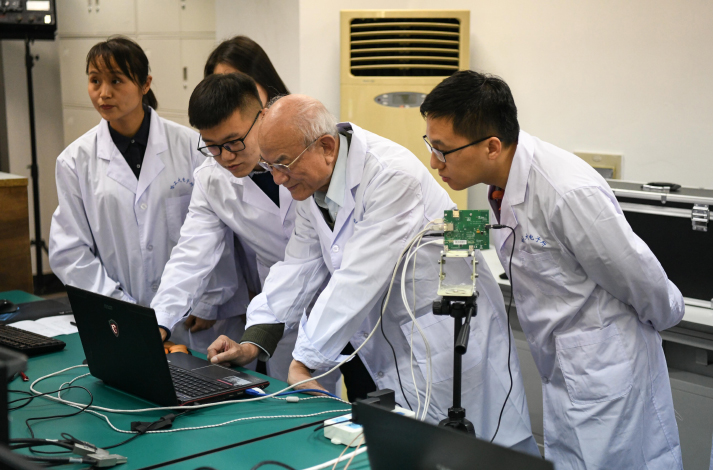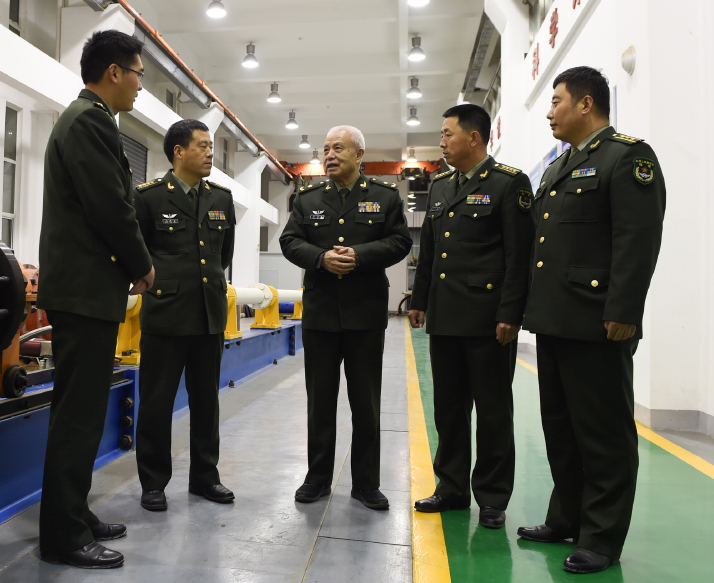|
||||||
|
||||||
| Home Nation World Business Opinion Lifestyle China Focus ChinAfrica Multimedia Columnists Documents Special Reports |
|
||||||
|
||||||
| Home Nation World Business Opinion Lifestyle China Focus ChinAfrica Multimedia Columnists Documents Special Reports |
| Nation |
| Science Superheroes |
| Scientists receive national awards for their outstanding achievements |
| By Lu Yan · 2019-01-21 · Source: NO. 4 JANUARY 24, 2019 |
 Liu Yongtan works at a lab at the Harbin Institute of Technology in Harbin, capital of northeast China's Heilongjiang Province, on December 25, 2018 (XINHUA)
In 1935, the first radar system was developed by British physicist Sir Robert Alexander Watson-Watt and his team. A year later, in another continent over 10,000 km away, Liu Yongtan was born in Nanjing, east China's Jiangsu Province. His entire life has been closely intertwined with radar technology. For almost four decades, Liu has devoted himself wholeheartedly to modernizing China's maritime radar system widely used in both civilian and military fields. On January 8, the 83-year-old Liu stepped onto the stage at the National Science and Technology Award Conference held at the Great Hall of the People in Beijing. President Xi Jinping presented the State Preeminent Science and Technology Award, China's top science award, to Liu and Qian Qihu, a defense engineering expert. "As China has flourished, I have only contributed my share," Liu said. Starting from scratch Liu's desire to contribute to his country began at an early age. Less than a year after he was born, he and his family had to flee their hometown during China's war of resistance against Japanese aggression, which lasted until 1945 when Japan surrendered in World War II. The memory of being homeless and drifting from place to place was imprinted in Liu's memory forever. It was during his childhood that he determined to do something to make China stronger. In 1953, Liu was admitted to the Department of Electrical Engineering of the Harbin Institute of Technology (HIT), one of China's leading research universities. Five years later, he became a lecturer at his alma mater. In 1979, he was one of the first batch of Chinese scholars to pursue advanced studies overseas. At the University of Birmingham in the UK, Liu connected with renowned experts and scholars in the electronic, electrical and systems engineering fields and read a good amount of scientific literature in English. During his research and study, he formed a new concept on radar. While a conventional radar system could only cover a 20-percent ocean monitoring range, a modern one could achieve the full monitoring of a country's territorial waters. At the time, some developed countries were seeking to develop a modern radar system; thus, Liu believed that China should start developing its own modern radar system. In 1981, he came back to China and continued his work at HIT, with a new goal in his heart: to blaze a new trail in China's radar development. He faced enormous challenges, however, including the difficulty of the development itself plus a foreign blockade on new technologies. Despite the obstacles, Liu still believed that China's modern radar system could be completed, that it was only a matter of time and practice. After 10 months of hard work, Liu finished a report on the viability of modern radar development, which got approval from the national authority. In 1989, with a new research team at HIT, he established China's first new-system radar station and developed the country's first new maritime radar system. In 1990, Liu and his team completed the first long-range detection experiment, which represented a major breakthrough for the application of a modern radar system in ocean exploration. A year later, the research was the first prize winner of the National Prize for Progress in Science and Technology. But Liu wasn't satisfied with his accomplishments and continued his research. In 2011, his team developed an all-weather and all-time radar system with a long-range detection function, which rivaled international advanced levels. His team again won the first prize of the National Prize for Progress in Science and Technology. "We still have a long way to go to catch up to the world's most advanced radar technologies. But as long as we keep trying, we will get there," Liu said. This year, the two winners of the State Preeminent Science and Technology Award each received an 8-million-yuan ($1.18 million) prize, a 3-million-yuan ($444,000) increase from previous years. First established in 2000, the award has been given to 31 prestigious scientists.  Qian Qihu exchanges ideas with colleagues at a lab in Nanjing, east China's Jiangsu Province, on December 27, 2018 (XINHUA)
A national defense expert The other recipient, Qian, is one of China's top military engineers with expertise in building underground defense infrastructure. As a protection engineering major, Qian, born in 1937, started his lifetime devotion to China's national defense over 60 years ago. Protection engineering mainly focuses on engineering works that defend against weapons of mass destruction, especially nuclear weapons. Because protection engineering is under the military field, it is not well-known by the general public. Qian puts it very simply: Weapons are spears and protection engineering is the shield. It is China's last line of national defense and a shield for the country's strategic command, strategic weapons and people's lives and property security in case of possible future wars. China's research in the anti-nuclear defense system started in the 1960s. Qian was assigned to design protective gates for aircraft sheds that could resist the shockwaves of a nuclear explosion. To make his invention possible, he had to learn the finite element method—at the time, an emerging advanced calculation method—from scratch. His hard work paid off in 1975 when he and his team successfully designed a protective gate with the largest span and highest resistance in the country. In the following years, he made great contributions to China's military defense. He is also an expert in designing and building tunnels for civilian transportation, playing an important role in major national projects such as the Hong Kong-Zhuhai-Macao Bridge, the South-to-North Water Diversion Project and the West-to-East Natural Gas Transmission Project. After being awarded the 8-million-yuan prize, Qian decided to donate the money to his hometown, Kunshan in Jiangsu, to establish a fund and help local students from poor families get quality education. The award money is only a small part of Qian's contribution to society. In the future, the 82-year-old academician at the China Engineering Academy will continue to offer his experience and expertise to China's projects concerning people's livelihood and national security. "I will give my suggestions and solutions to major problems in some construction projects," Qian told Global Times. At the National Science and Technology Award Conference, along with Liu and Qian, 278 scientific and technological projects were honored, with 38 winning the State Natural Science Award, 67 the State Technological Invention Award, and 173 the State Scientific and Technological Progress Award. Copyedited by Rebeca Toledo Comments to luyan@bjreview.com |
About Us | Contact Us | Advertise with Us | Subscribe
|
||
| Copyright Beijing Review All rights reserved 京ICP备08005356号 京公网安备110102005860号 |